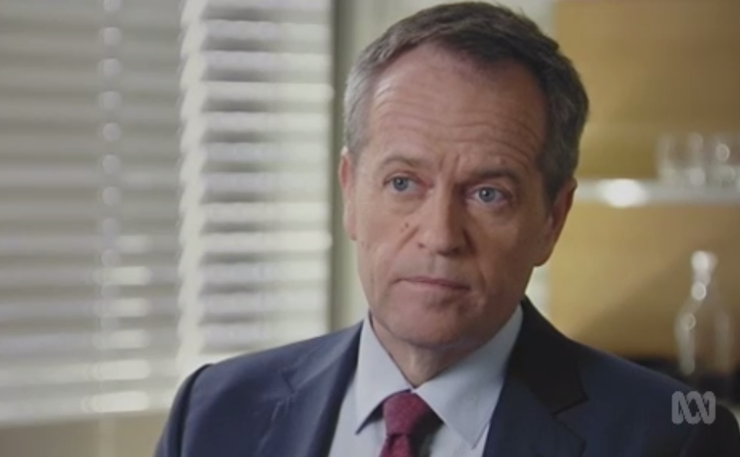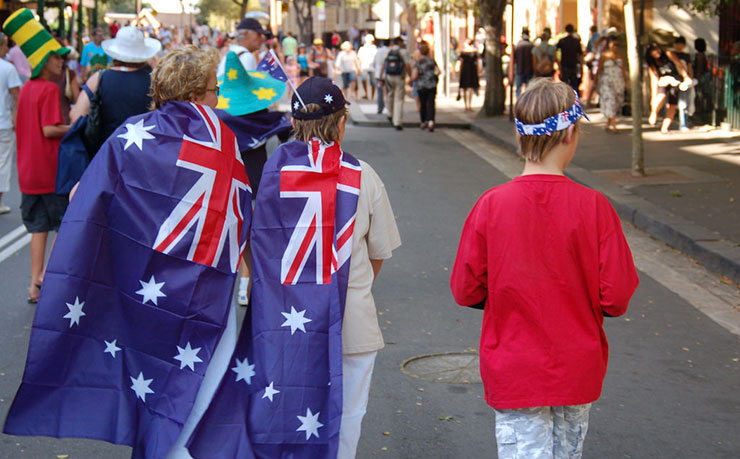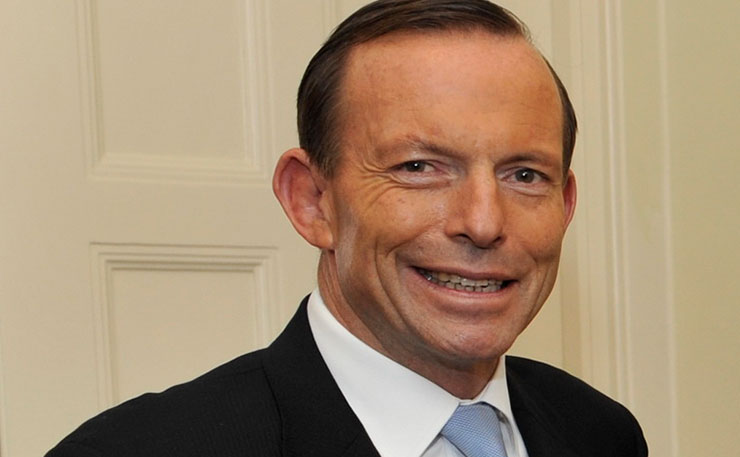Never before has so little been done by so few to advance bugger-all in the way of common sense and healing. Michael Bradley explains.
Trust Tony Abbott to sum it up. There is no social issue so complex, so fraught with nuance, that Tony cannot effortlessly reduce it to a short phrase which lays bare what we’re really talking about.
So it is with Australia Day. Cutting right through the debate about foundation vs. invasion, celebration against retraumatisation, Tony tweeted his considered view:
There are 364 other days a year for the Greens to be politically correct. Why can’t they just accept that Jan 26 is the best available day to celebrate all that’s good about life in Australia.
— Tony Abbott (@TonyAbbottMHR) January 15, 2018
Brilliant in its misleading simplicity, this tweet is the whole argument in a nutshell. The immediate provocation was Greens leader Richard di Natale’s declaration of full-on support for the Change the Date movement, which kicked off seriously last year and is getting exponentially more attention this time around.
You can always tell how triggered conservatives are by the violence of their response. Malcolm Turnbull, the former progressive, has even issued a special video in which he Malsplains to us why we should switch back to the cricket and leave such important questions to his infinite wisdom.
Bill Shorten, as usual, rushed to his support for fear of being wedged. Pathetic.

Still, nobody’s going to voluntarily watch Malcolm (or Bill) talking, so we need the big guns: Abbott’s been unleashed, John Howard can’t be far behind.
The rationale for changing the date of Australia Day (which, disclosure, my law firm supported last year and will this year by opening for business on 26 January) is a simple proposition: the current date marks the arrival of the First Fleet, with which commenced the forced colonisation of Australia by Great Britain and the subjugation and dispossession of its Indigenous population without negotiation, treaty or compensation.
Whatever you think about how it all turned out, most Indigenous Australians alive and dead are unlikely to agree that it has been a good thing for them. You can hold the view that they’re wrong, and should be grateful, but you should also be able to recognise that they’re (mostly) not happily excited about the date.
The rational debate of historical right and wrong can go in circles forever, but the actual reality is that, for Indigenous Australians, 26 January is a hurtful remembrance. The point of changing the date of Australia Day is, simply, to remove that hurt.
Rubbish, says Tony. His tweeted counter-argument has three elements. First, he goes straight to the defensive in his insistence that this whole Change the Date business is just Political Correctness Gone Mad. The Greens and other leftist fringe-dwellers are picking a fight for the sake of it instead of making Jobs and Growth like the grown-ups do.

It’s an interesting reflex, this Political Correctness line. Apparently it’s a complete answer, in the conservative mind, to any idea which challenges the status quo. Nothing to see here, just the fairies at the bottom of the garden being silly again.
Of course, Tony exaggerates when he says we can play political correctness games on all 364 of the other days of the year. I’m pretty sure ANZAC Day, Remembrance Day, Christmas Day, Good Friday and Easter Sunday are out, for starters. Actually Sundays generally are problematic in Tony’s Christian universe. Oh, and the Queen’s Birthday. Possibly Cardinal Pell’s birthday too. But is there ever really a good day for bucking convention? Not for Tony.
So we come to the core of Tony’s debating logic: “Why can’t they just accept…?” Demonstrating all the rhetorical sophistication of a 5-year-old having a tantrum, Tony asks the obvious question: why won’t they just agree that the way things are is the only way they can be?
January 26 is “the best available day” (funny irony: Tony unconsciously adopts the American date format of Jan 26 instead of the British 26 Jan; but the US didn’t colonise us until 21 March 1942 when General MacArthur arrived in Melbourne). Put aside availability; he’s already pointed out that there are 364 other open candidates with no baggage attached.
The key word is “best”, in that the 26th is the very best choice of date to “celebrate all that’s good about life in Australia”.
So, what is good about life in Australia? Actually, plenty. Peace, prosperity, democracy, stable government, low crime, good health and education, multiculturalism. True, most of these counters of national wellbeing apply substantially less or not at all to Indigenous Australians (and none of them to asylum seekers). But, overall for the vast majority of us, Australia is a bloody good place to be.
What is the logic that dictates the date on which British colonisation commenced as the “best” day for celebrating this bloody goodness? Tony wouldn’t shy away from it; the only available rationale is that all of this goodness stems from the arrival of the First Fleet. That British colonisation was a blessing, unalloyed. And, therefore, we should be grateful. All of us.

Well, of course, he’s right. Australia would not be what it is had it not been made forcibly part of the British Empire and heavily repopulated, first by British people, then by white people more generally but exclusively, eventually by people from literally everywhere. For better or worse, this nation is part-made of the legacy of imperial conquest. Only part, mind you, but it’s a big part.
Australia Day should be about celebrating what’s good in this country. From the standpoint of white privilege, 26 January is the “best” suited day for that purpose, because what’s good can be traced back to 1788.
That’s the whole debate. In the Tony-way of seeing, Australia’s good history commenced on 26 January, and he can see the straight wide road stretching back to that starting point from today’s serene peak of national contentment. In a sense, he’s right.
However, the road isn’t so straight. And it’s paved with the discarded rights of the 700,000 or so Indigenous people who were here on 25 January 1788. For their descendants, Australia’s present is not so unambiguously good as it is for Tony. They may prefer to celebrate the good parts with the rest of us. We could exercise a little bit of (dare I say Christian) empathy by choosing a date not shadowed for them by hurt.
Are we really so small of heart as Tony would like us to believe?
Donate To New Matilda
New Matilda is a small, independent media outlet. We survive through reader contributions, and never losing a lawsuit. If you got something from this article, giving something back helps us to continue speaking truth to power. Every little bit counts.




